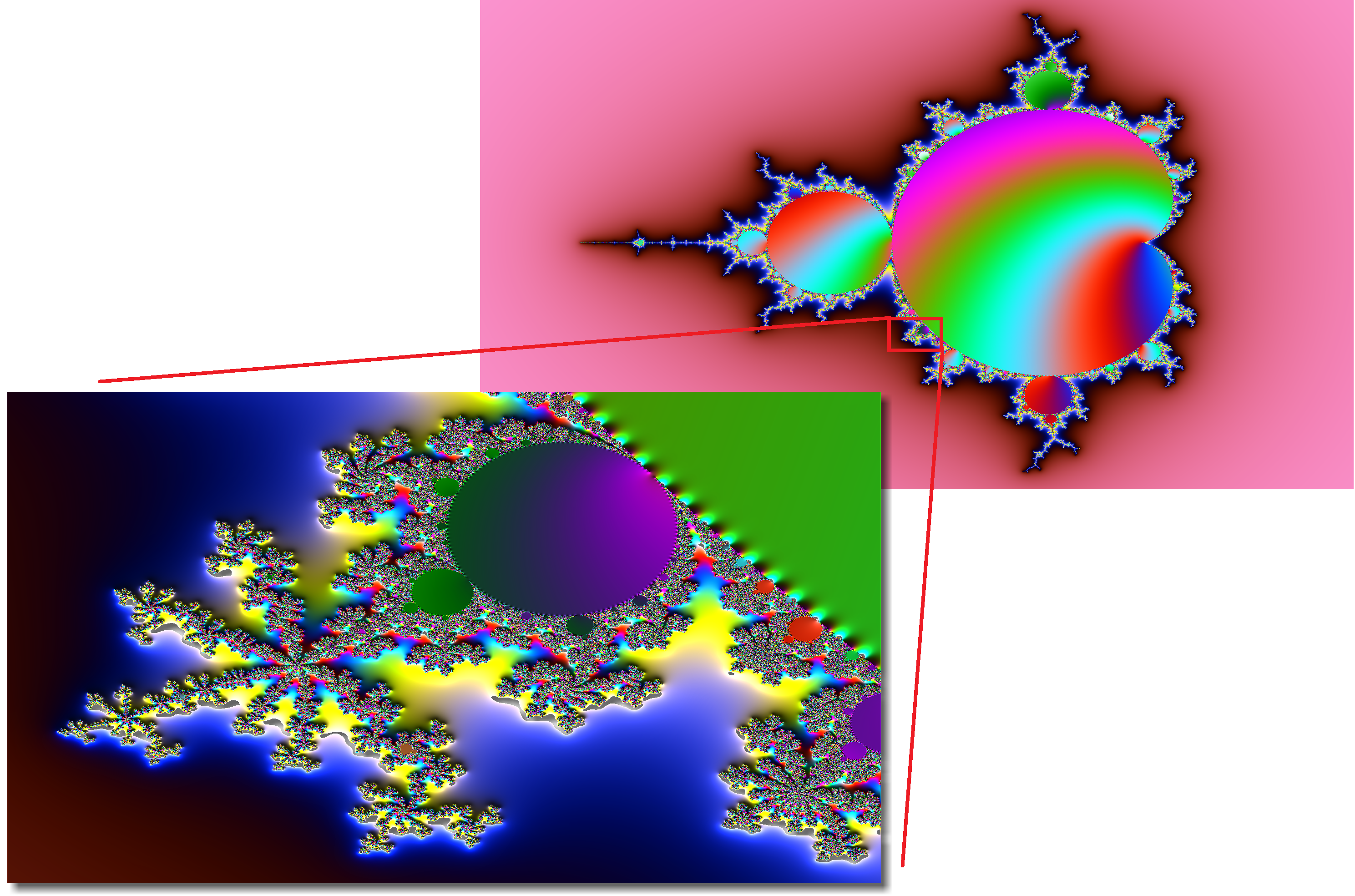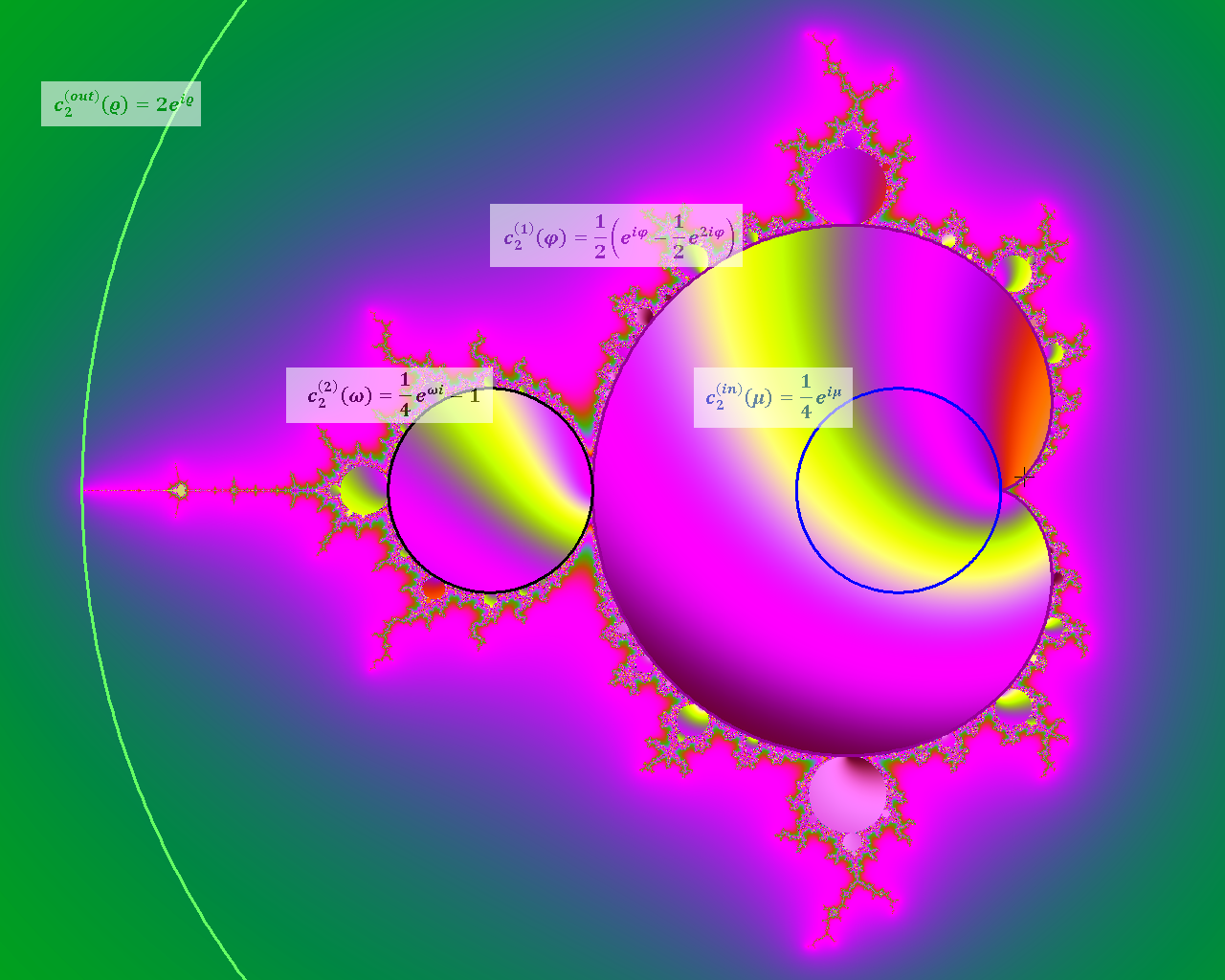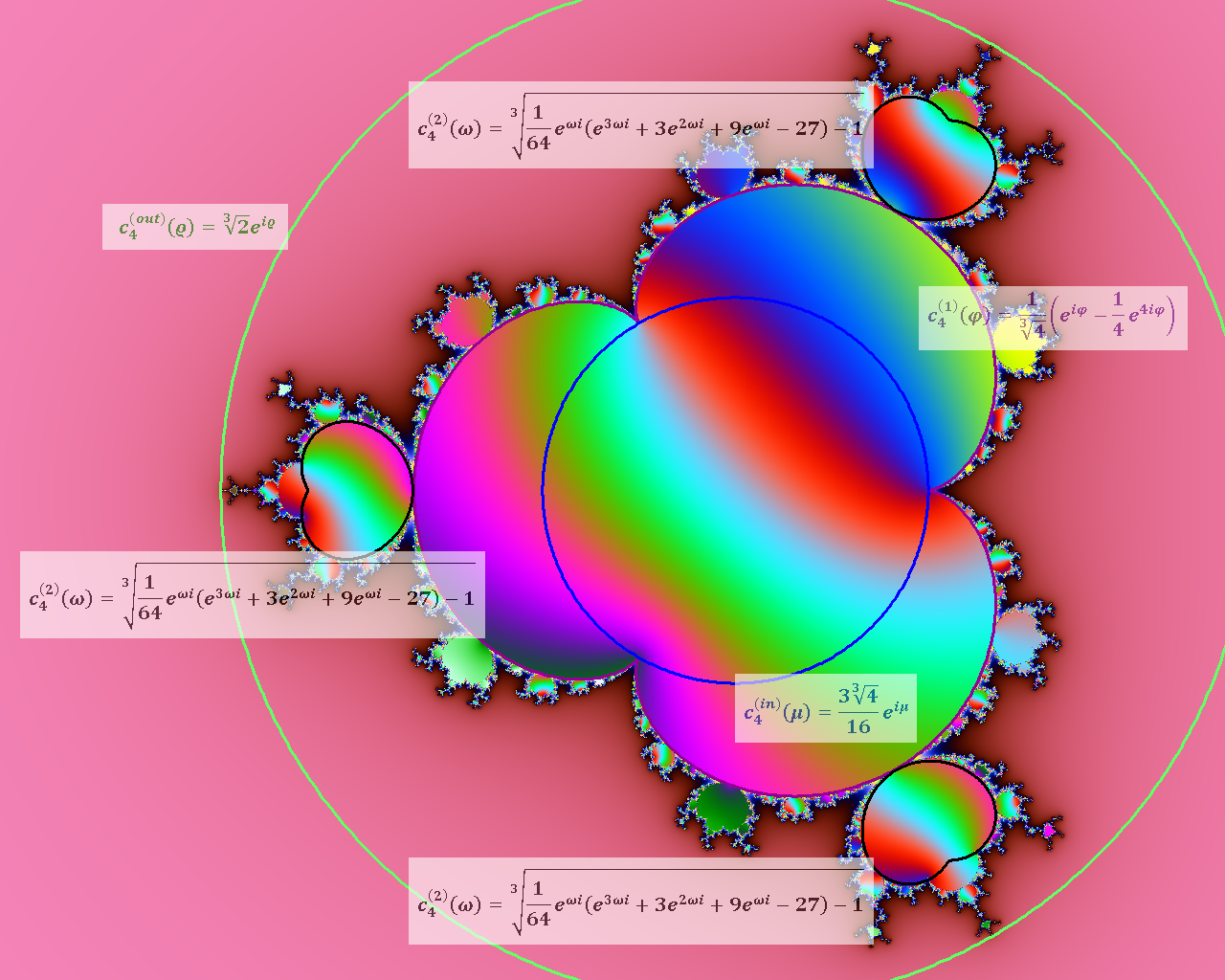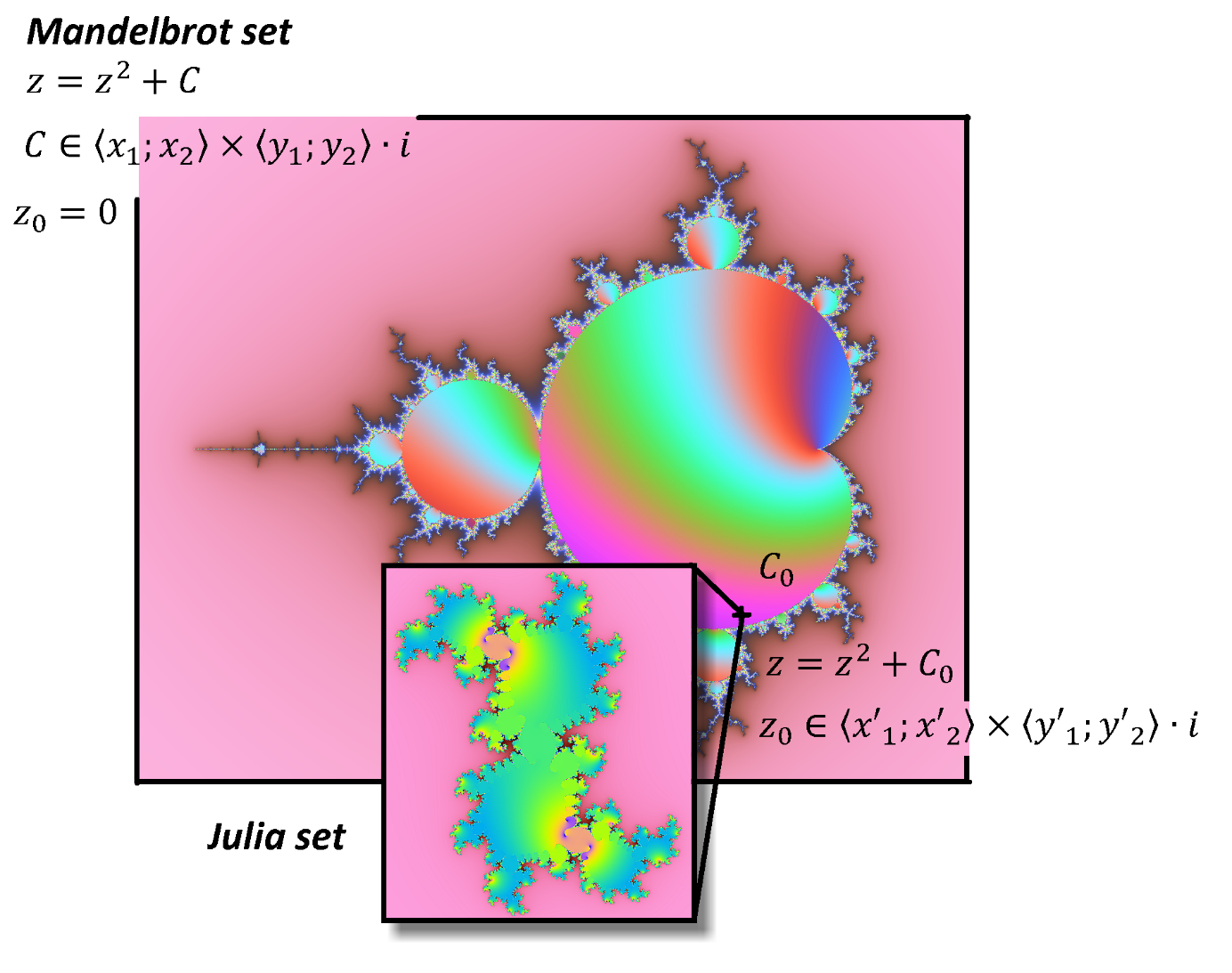- Subjects: Mathematics
- |
- Contributor:
- Dalibor Martišek
- Mandelbrot set
- main hyperbolic component
- internal bound
- external bound
- Julia set
- curve of m-th period
This contribution provides a description of some interesant curves contained in the Mandelbrot set. Julia sets run along them in introductory video (low resolution due to limited file size, HD in dmartisek.cz/Veda/Journey_around_the_Mandelbrot_Set.m4v
1. Background
The Mandelbrot set was discovered in 1979 during an attempt to catalogize the sets that Gaston Julia and Piere Fatau studied in the second decade of the 20th century. It is a dynamic system whose behavior is described by the equation

or more generally

where  is a non-constant holomorfic function. This series converges for some values
is a non-constant holomorfic function. This series converges for some values  and diverges for other points. The Mandelbrot set consists of all points
and diverges for other points. The Mandelbrot set consists of all points , for which described process does not diverge. Formally:
, for which described process does not diverge. Formally:

For each non-constant holomorfic function  , there exists one and only one Mandelbrot set. Its visual representation may be created by determining, for what points
, there exists one and only one Mandelbrot set. Its visual representation may be created by determining, for what points  sequence
sequence  is bounded. In Fig. 1 we can see Mandelbrot set (marked as black) for functions
is bounded. In Fig. 1 we can see Mandelbrot set (marked as black) for functions  (on the left),
(on the left),  (in the middle) and
(in the middle) and  (on the right) in the Gaussian plane.
(on the right) in the Gaussian plane.

Figure 1. Mandelbrot set (marked as black) for functions. (on the left),
(on the left),  (in the middle) and
(in the middle) and  (on the right)
(on the right)
2. Visual Representation of the Mandelbrot Set
Visual representation of the Mandelbrot set may be created by determining all points  whether
whether  is bounded. The number of iterations to reach a choosen radius can be used to determine the color to use – it is so caled Integer Escape-Time (IET) algorithm. However, this algorithm creates clearly visible colour discontinuities – see Fig. 2 up. Therefore, so called Smooth Escape-Time algorithm is better. It is applicable to polynomial function
is bounded. The number of iterations to reach a choosen radius can be used to determine the color to use – it is so caled Integer Escape-Time (IET) algorithm. However, this algorithm creates clearly visible colour discontinuities – see Fig. 2 up. Therefore, so called Smooth Escape-Time algorithm is better. It is applicable to polynomial function

(after some steps therefore
therefore  ).
).

Figure 2. Visualization of the Mandelbrot set. Integer Escape-Time (up), Smooth Escape-Time (down).
Let us assume that  is choosen escape radius and the divergence is detected in the
is choosen escape radius and the divergence is detected in the  -th step. In this case
-th step. In this case  , and (constant)
, and (constant)  -th colour belongs to this whole interval in IET algorithm. It is necessary to calculate a parameter
-th colour belongs to this whole interval in IET algorithm. It is necessary to calculate a parameter  to assign „
to assign „ “-th colour for continuous transition. We need a suitable function for the transformation
“-th colour for continuous transition. We need a suitable function for the transformation  . Value
. Value

is applicable for this purpose for example – see Fig. 2 down.
Moreover, value  can be understood as an altitude and the Gaussian plane around the Mandelbrot set can be illustrated as 3D object. Near surrounding of the border is especially interesting – see Fig 3.
can be understood as an altitude and the Gaussian plane around the Mandelbrot set can be illustrated as 3D object. Near surrounding of the border is especially interesting – see Fig 3.

Figure 3. Detail of the Mandelbrot set illustrated as 3D object
3. Curves of the First Period
Curves of the m-th period are boundaries of areas called „bulbs“ which are described approximately only in present. In this paper, some of them are described analyticaly – curves of the first period, the boundary of the main hyperbolic component, internal and external bounds and also some curves of the second period.
In [1], we can read about the Mandelbrot set of the second degree: „It should be pointed out that the bulbs’ apparent circular shape is indeed only approximate.“ We proved [2] that the curve of the second period in this set is precise circle. The curves of the higher period cannot be precise circles because the Mandelbrot set is generated by nonlinear transforms. However, it is possible to obtain their analytical description on principle.
In the following text, we will analyse sets  for which
for which Sets of points for which is
Sets of points for which is

and

are callled a curve of the  period. We denote
period. We denote  . Curves of the first period are sets
. Curves of the first period are sets
3.1. The Boundary of the Main Hyperbolic Component
The main hyperbolic component  is the subset of
is the subset of  for which the orbit does not diverge. It is bounded by
for which the orbit does not diverge. It is bounded by  . In case of
. In case of  ,
,
and equation of  is possible to obtain from
is possible to obtain from  , i.e.
, i.e. 
According to Banach fixed-point theorem, its points must satisfy the condition  and for its boundary
and for its boundary  . These conditions lead to equation of the main hyperbolic components as
. These conditions lead to equation of the main hyperbolic components as
(see [2] for more information)

The subscript (1) means that  is the curve of period one – if
is the curve of period one – if  lies on this curve, then
lies on this curve, then  lies on the curve too. For the classic Mandelbrot set is
lies on the curve too. For the classic Mandelbrot set is  and we have
and we have

There is  for
for  and
and

By analogy

These curves are marked as pink in Figures 4,5,6.

Figure 4. Curves of the first and second period for 

Figure 5. Curves of the first and second period for 

Figure 6. Curves of the first and second period for 
It is important to note that and
and and therefore
and therefore It means that these curves converge into the unit circle.
It means that these curves converge into the unit circle.
3.2. Internal Bound
For speeding up rendering of the Mandelbrot set, it is possible to detect as internal points those belonging into the curve of period one. They lie on the circle with the centre  and radius
and radius  This condition gives
This condition gives

(see [2] for more information). These circles are marked as pink in Figures 2, 3, 4.
3.3. External Bound
Rendering of the Mandelbrot set is possible to accelerate also by external bound detection – the escape radius mentioned in section 2 does not have to be bigger than radius of the external bound. We can assume that outside the escape zone  is already bigger than
is already bigger than  therefore
therefore

It means

(see [2] for more information). These circles are marked as pink in Figures 2, 3, 4.
4. Curves of the Second Period
Curves of the second period are sets

These curves are boundaries between convergence and divergence process

According to Banach fixed-point theorem, it must be

again.
4.1. Curves of the Second Period for 
We have to find roots of

that are not roots of

The calculations are already very technically dificult and are performed in [2].
The result is

This circle is marked as black in Figures 2, 3, 4.
4.2. Curves of the Second Period for 
According to previous section: for  , we have to find roots of
, we have to find roots of

that are not roots of

The result is

For  , we can obtain
, we can obtain

5. Julia Sets
In case of the Mandelbrot set, iteration process

where  is the constant start point and
is the constant start point and  „lives“ in a rectangle
„lives“ in a rectangle . Therefore, there exists one and only one Mandelbrot set for given function
. Therefore, there exists one and only one Mandelbrot set for given function  .
.
On the other hand, Julia set arises as a result of iteration proces

where  is constant and starting point
is constant and starting point  „lives“ in a rectangle
„lives“ in a rectangle  Therefore, there exist infinitely many Julia sets for each Mandelbrot set. This situation is illustrated in Figure 7.
Therefore, there exist infinitely many Julia sets for each Mandelbrot set. This situation is illustrated in Figure 7.
Figure 7. Mandelbrot set and its Julia sets.
6. Journey Around the Mandelbrot Set
If is placed inside Mandelbrot set, then Julia set is connected and it is disconnected in case of outside placement. The most interesting shapes of the Julia set can be found near the boundary of the Mandelbrot set, i. e. near its periodical curves. Complete video contains hundreds of thousands frames with Julia sets near the curve of the first and second period the classical Mandelbrot set (irregularly alternatively outside and inside). It runs a number of hours. Computing demandingness was approx. 80 days per (common) processor. For demonstration purposes, the video was shortened to less than seven minutes
is placed inside Mandelbrot set, then Julia set is connected and it is disconnected in case of outside placement. The most interesting shapes of the Julia set can be found near the boundary of the Mandelbrot set, i. e. near its periodical curves. Complete video contains hundreds of thousands frames with Julia sets near the curve of the first and second period the classical Mandelbrot set (irregularly alternatively outside and inside). It runs a number of hours. Computing demandingness was approx. 80 days per (common) processor. For demonstration purposes, the video was shortened to less than seven minutes
